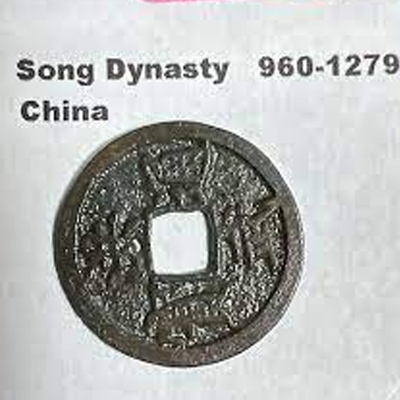Each paragraph has been written with one main point to express. It is your job to find out what it is because this helps you pick the correct heading. One example is usually given and so you do not need to look at this paragraph. Start with the next paragraph that needs a heading. You can answer the questions in any order.
Questions 1 – 5
The reading passage has six paragraphs, A-F .
Choose the correct heading for paragraphs, B-F , from the list below.
| Headings | |
| i | Bills of Exchange |
| ii | The English Civil War |
| iii | Gold standard |
| iv | The Knights Templar |
| v | Paper money |
| vi | Goldsmith bankers |
| vii | Chinese copper coins |
| viii | Virginian money |
| ix | Intangible money |
| x | The British pound |
| Example Paragraph A Answer= V | |
| 1 | Paragraph B |
| 2 | Paragraph C |
| 3 | Paragraph D |
| 4 | Paragraph E |
| 5 | Paragraph F |
Money
| A | In China the issue of paper money became common from about AD 960 onwards but there had been occasional issues long before that. A motive for one such early issue, in the reign of Emperor Hien Tsung 806-821, was a shortage of copper for making coins. A drain of currency from China, partly to buy off potential invaders from the north, led to greater reliance on paper money with the result that by 1020 the quantity issued was excessive, causing inflation. In subsequent centuries there were several episodes of hyperinflation and after about 1455, after well over 500 years of using paper money, China abandoned it.
|
| B | With the revival of banking in western Europe, stimulated by the Crusades, written instructions in the form of bills of exchange, came to be used as a means of transferring large sums of money and the Knights Templar and Hospitallers functioned as bankers. (It is possible that the Arabs might have used bills of exchange at a much earlier date, perhaps as early as the eighth century). The use of paper as currency came much later.
|
| C | During the English Civil War, 1642-1651, the goldsmiths' safes were secure places for the deposit of jewels, bullion and coins. Instructions to goldsmiths to pay money to another customer subsequently developed into the cheque (or check in American spelling). Similarly goldsmiths' receipts were used not only for withdrawing deposits but also as evidence of ability to pay and by about 1660 these had developed into the banknote.
|
| D | In England's American colonies a chronic shortage of official coins led to various substitutes being used as money, including, in Virginia, tobacco, leading to the development of paper money by a different route. Tobacco leaves have drawbacks as currency and consequently certificates attesting to the quality and quantity of tobacco deposited in public warehouses came to be used as money and in 1727 were made legal tender.
|
| E | Although paper money obviously had no intrinsic value its acceptability originally depended on its being backed by some commodity, normally precious metals. During the Napoleonic Wars convertibility of Bank of England notes was suspended and there was some inflation which, although quite mild compared to that which had occurred in other wars, was worrying to contemporary observers who were used to stable prices and, in accordance with the recommendations of an official enquiry, Britain adopted the gold standard for the pound in 1816.
|
| F | The break with precious metals helped to make money a more elusive entity. Another trend in the same direction was the growing interest in forms of electronic money from the 1990s onwards. In some ways e-money is a logical evolution from the wire transfers that came about with the widespread adoption of the telegraph in the 19th century but such transfers had relatively little impact on the everyday shopper.
|
Answers
1. i – Bills of Exchange
2. vi – Goldsmith bankers
3. viii – Virginian money
4. iii – Gold standard
5. ix – Intangible money


